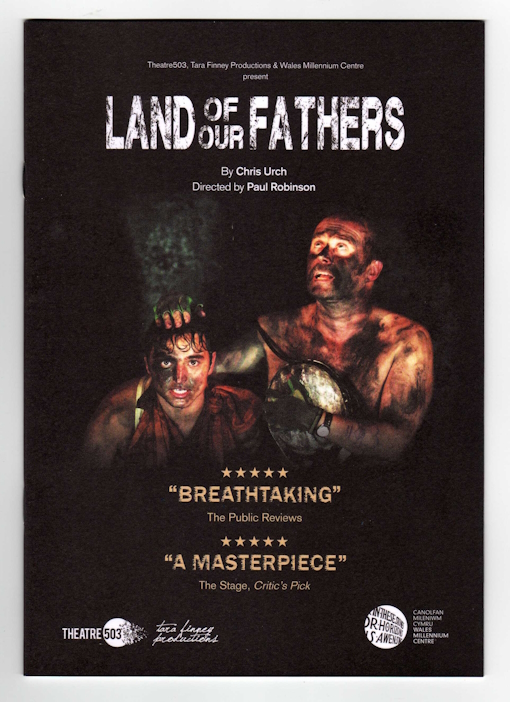Land of Our Fathers reviewed at Liverpool Playhouse Studio
Land of Our Fathers is a play by Chris Urch. This review is based on its run at Liverpool Playhouse Studio from 1-5 March 2016.

These days, grime is a music genre, the sound of urban Britain, but back in 1979 it had no such cultural connotations. Grime was the stuff that working men scrubbed from their skin after a shift at the factory, at the furnace, at the coal face. There’s a lot of grime in Land of Our Fathers at Liverpool Playhouse Studio – the ground-in kind, like Polyfilla for crow’s feet. And by the end of this intense and very masculine drama, written by Chris Urch and directed by Paul Robinson, I felt sweat-slicked and filthy, as if I too had spent days trapped with my comrades deep underground.
Set in early May 1979 – beginning on the day of Margaret Thatcher’s election to Downing Street – Land of Our Fathers is the story of six South Wales miners sealed into a subterranean cell following a roof collapse. Having cast their votes before heading off to work, they now face the prospect of days and nights divorced from the concerns of life on the surface. They are the victims of turbulence and unrest deep within our planet, but down in their pitch-black hole, they can only wonder at the seismic political shifts occuring far above their heads.
There are few scenarios more terrifying to me than the prospect of being trapped underground, but at the start of this play, the miners seem to almost shrug off the fear. Perhaps they have been well drilled during training, or maybe they simply see it as an occupational hazard – something almost bound to happen to men working 1,000 feet down inside the earth. Either way, they seem disciplined and determined, almost certain that rescue is not far away.
They bicker unceasingly, as close-knit groups of workmates often do. They take the mick and they take it on the chin, but always with the knowledge that behind the banter they stand together, shoulder-to-shoulder, banners unfurled. It’s one of the reasons why the National Union of Mineworkers was the most powerful union of them all, of course. For miners, solidarity wasn’t just a word. It was a matter of life and death.
But as time passes, the solidarity starts to wear thin. Beneath each miner’s helmet stands a man wracked with insecurity and doubt. There are sibling rivalries, personal enmities, even power struggles – and a few deeper secrets too. When a character called Chopper says, “Men don’t talk about themselves. That would be pointless,” he believes he is stating a fact. Under pressure from the stifling environment, however, it is soon revealed to be false.
While it would be glib to compare the tiny black-walled Playhouse Studio with the claustrophic confines of a coal mine, it certainly feels like a great place in which to see this enthralling play. With its low ceiling and light-sapping surfaces, and a tight coal-face set (designed by Signe Beckman) resembling the crystalline crust of a black Rowntree’s Fruit Pastille, the space thrusts the audience right up against raw human emotion as the prospect of rescue seems to fade.
With its simple set and six richly drawn characters, Land of Our Fathers is perfectly suited to the theatre, but it shares much of its spirit with television drama of the 1970s and early 1980s. Back in the golden era of Play for Today, when Northern working-class writers and directors presented real lives and real stories on our screens, it was common to see groups of working men laughing, loathing and loving in spite of themselves.
Ken Loach’s The Price of Coal, Alan Bleasdale’s The Black Stuff and Dick Clement and Ian La Frenais’s Auf Wiedersehen Pet all seem like close ancestors, and with its period references and cultural allusions – at one point, the men gather to perform a Flying Pickets-style Sex Pistols a cappella – there is much that connects this piece with a bygone dramatic age.
It remains, however, very much a play from today, having begun life in 2013 at Theatre503 in Battersea. Since then its reputation has grown steadily, following a transfer to Trafalgar Studios and the subsequent involvement of the Wales Millennium Centre who have helped stage this current national tour.
For me, there is no mystery to its success. Its six characters are all well defined and beautifully performed, and its plot follows a relentless downward trajectory, like a plummeting miners’ cage. From naive young Mostyn (Joshua Price) who comes across as a kind of Pike from Dad’s Army with added coal dust, through to Bomber (John Cording), the socialist elder statesman whose commitment to community conceals a more private kind of pain, this is an excellent cast carrying the weight of the world – or the weight of South Wales – on its shoulders.
Land of Our Fathers isn’t perfect – the two-handed tussles sometimes lack momentum, with the actors seeming to prowl round plot points rather than delivering truths straight from the heart – but in its ensemble work, this is powerful and often very moving stuff.
If you’re of a claustrophobic persuasion, it might be best to carry a memory of rolling fields and open sea shores as you take your seat in the Studio’s gloom, but for anyone whose follicles stand on end at the sound of proud Welsh miners singing hymns of adversity and defiance, you shouldn’t miss this grubby little play.
The sound of industrial solidarity might not have been designed to pack out the dancefloor, but just like grime, it’s the voice of a dispossessed generation. Except in this case, it’s a generation that’s now almost gone for good.
Land of Our Fathers ran at Liverpool Playhouse Studio from 1-5 March 2016.
This review originally appeared on the website Northern Soul.
© Damon Fairclough 2016
Share this article
Follow me